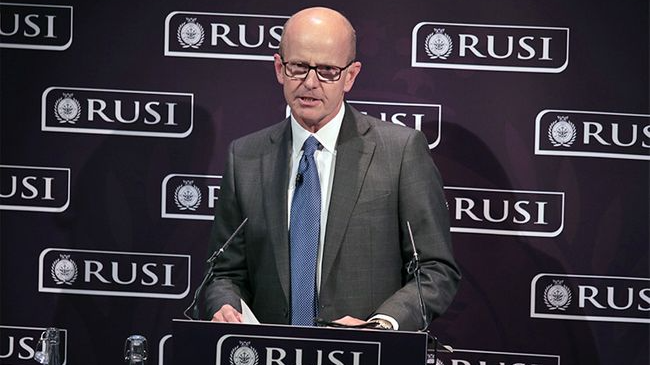
Jeremy Fleming, director of Britain's GCHQ spy agency, deliveing the 2022 RUSI Annual Security Lecture, London, th UK. /GCHQ
Jeremy Fleming, director of Britain's GCHQ spy agency, deliveing the 2022 RUSI Annual Security Lecture, London, th UK. /GCHQ
Editor's note: Abhishek G Bhaya is a senior journalist and international affairs commentator. The article reflects the author's opinions and not necessarily the views of CGTN.
British spy chief Jeremy Fleming on Tuesday raised a misplaced alarm over Beijing's growing "technological dominance" as he described the matter as "an increasingly urgent problem" for Western countries, ratcheting up the ongoing campaign of disinformation and propaganda against China.
Fleming's anti-China tirade during a speech to the RUSI defense think-tank in London exposed further the West's lingering paranoia that is rooted more in the fear of losing their global hegemony than any reasonable trace of provocation from Beijing.
"Technology has become not just an area for opportunity, for competition and for collaboration. It has become a battlefield for control, for values and for influence," ranted Fleming, the director of Britain's GCHQ spy agency, mislabelling China's phenomenal success, achieved with decades of genuine diligence and research, in new technologies such as satellite navigation – with its BeiDou system – and digital payment systems including its digital yuan as Beijing's "quest for dominance."
Fleming, who has been the head of the cybersecurity agency since 2017, called on Western allies to act in haste and invest in next-generation technologies to prevent China from gaining a global edge in this sector. He toned down the rhetoric marginally by insisting that the UK has "no issue with the people of China and the Chinese community who contribute hugely to life here in the UK."
Beijing was obviously not impressed and rejected Fleming's anti-China scaremongering as baseless allegations. "The remarks of the British official have no factual basis at all," Chinese Foreign Ministry Spokesperson Mao Ning told reporters on Tuesday.
"China's technological development is aimed at making lives better for the Chinese people. It does not target anyone, still less pose any threat. Subscribing to the so-called 'China threat' and stoking confrontation benefits no one and will eventually backfire," she added.
There certainly is merit to Mao's line of argument.
There was a time, not too long ago, when the global technology sector was dominated largely by American tech monopolies known as the FAANG, the acronym for Facebook (now Meta), Apple, Amazon, Netflix, and Google (or Alphabet). Barring a few concerns raised over privacy and data protection over these tech giants' widening global reach; did you ever see or hear any country branding the entire U.S. tech sector as a global threat? None, and quite reasonably so.
However, the unease and paranoia in the U.S., the UK and across the Western world over the recent rise of homegrown Chinese tech giants, namely, Baidu, Alibaba, Tencent, and Xiaomi, also known as BATX, are only too evident. These Chinese firms have emerged as big players in the global tech landscape with their innovative, and in many cases, superior and cheaper products and services which make them more viable for consumers in a large part of the developing world – a key reason for their proliferation at a such fast pace in recent years.

Innovation has been a part of collective human progress. No country can lay claim to it exclusively for the benefit of a selected group of countries or have the intention to dominate the tech sphere forever. /CFP
Innovation has been a part of collective human progress. No country can lay claim to it exclusively for the benefit of a selected group of countries or have the intention to dominate the tech sphere forever. /CFP
Healthy and fair business competition is at the heart of a free market economy – governed by the laws of supply and demand without government intervention – which the U.S.-led West has seemingly championed for decades.
In that same thread, innovation has been a part of collective human progress. No country can lay claim to it exclusively for the benefit of a selected group of countries or have the intention to dominate the tech sphere forever. Sci-tech advantages must not be misused to suppress other countries' progress and development.
Evidently, those values and ethical practices were to be championed and defended only as long as the West dominated the global market across sectors.
With China catapulting as the world's second-largest economy, just behind the U.S., and making rapid strides across sectors including the critical information and communications technology (ICT), the U.S. and its Western allies have all but forgotten, or deliberately ignored, the basic rules and ethics of the game that they had laid out themselves.
The West is increasingly feeling threatened of losing their dominance in the ICT sector that they see as critical in perpetuating their global hegemony. And how do they react to this?
They unleash an information and propaganda war against China. They indulge in a campaign of misinformation, disinformation and half-truths against Chinese firms and entities, and of course, the Chinese government. They take to over-the-top scaremongering portraying everything emanating out of China as a threat to the world.
The British spy chief's needless diatribe portraying China's successful foray into technology as an "urgent problem" stems from the same script and only adds to the ongoing geopolitical and economic tensions between the West and China.
The West must come to terms with changing global dynamics, including in the field of technology, and the fact that their supposed global supremacy won't remain for eternity. Countries from Asia, Africa and the larger Global South will gradually take their deserving places under the sun. Any attempt to thwart this natural process will end in failure and the reason for the collective fall of the West.
Relinquishing the propaganda campaign of demonizing China to hide their own insecurities will be a good start.
(If you want to contribute and have specific expertise, please contact us at opinions@cgtn.com. Follow @thouse_opinions on Twitter to discover the latest commentaries on CGTN Opinion section.)